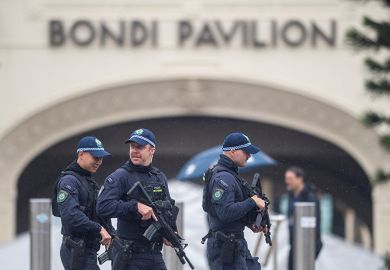Source: Alamy
A conference at Queen’s University Belfast on the legacy of the Charlie Hebdo murders will go ahead, the institution has announced, following the completion of a new risk assessment.
The event, titled “Understanding Charlie: New perspectives on contemporary citizenship” and scheduled for next month, had been called off last week.
Organisers said that Patrick Johnston, the vice-chancellor of Queen’s, did not wish for the symposium to go ahead because he was “concerned about the security risk for delegates and about the reputation of the university”.
But the university said that the event had been cancelled because a “complete risk assessment” had not been carried out.
Although one of the people involved with the event told Times Higher Education that a risk assessment had been submitted, the university’s case appeared to be that this had not gone far enough and had not involved consultation with external bodies such as the police.
Amid widespread criticism of the cancellation, Queen’s announced that a full risk assessment would be carried out and, following that exercise, the green light has now been given to the event.
“Following the completion of a comprehensive risk assessment, undertaken in line with approved protocols, the university is pleased to confirm that the Charlie Hebdo research symposium, organised by the Institute for Collaborative Research in the Humanities, has been approved,” a spokeswoman said.
The event will take place on 4 and 5 June, exploring notions of free speech and censorship in the wake of the shootings at the offices of the satirical newspaper Charlie Hebdo in Paris on 7 January. Twelve people were killed in that incident, and another eight fatalities followed in a series of violent confrontations in and around the French capital.
Patrick Corrigan, Amnesty International’s programme director for Northern Ireland, said the decision by Queen’s was “clearly the right one”.
“The original decision by the university to cancel the event generated significant public outcry, because people care passionately about this issue,” Mr Corrigan said. He added: “Freedom of expression, including academic freedom, must be defended robustly wherever it is threatened.”
Register to continue
Why register?
- Registration is free and only takes a moment
- Once registered, you can read 3 articles a month
- Sign up for our newsletter
Subscribe
Or subscribe for unlimited access to:
- Unlimited access to news, views, insights & reviews
- Digital editions
- Digital access to THE’s university and college rankings analysis
Already registered or a current subscriber?




